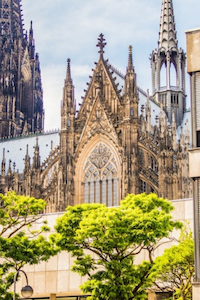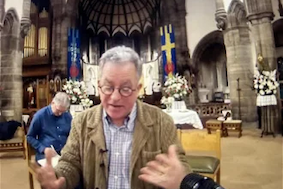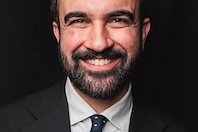Bishops warn German Synodal process has 'potential for schism'

Cologne Cathedral. Photo by Kevin Tadema on Unsplash
In an open letter, more than 70 bishops from North America, Africa, Italy and Australia have expressed their "growing concern" about the controversial German Synodal Path process and content, warning that it is causing confusion and the "potential for schism."
Nearly 50 are from the US, and signatories include US Cardinal Raymond L Burke, Nigerian Cardinal Francis Arinze, South African Cardinal Wilfred Napier, and Australian Cardinal George Pell.
The "fraternal open letter of 11 April to our brother bishops in Germany" said, "the Synodal Path's actions undermine the credibility of Church authority, including that of Pope Francis."
The German bishops, responding to ongoing revelations of clerical sexual abuse and how bishops mismanaged such cases, see the Synodal Path process as addressing the exercise of power and authority in the church; sexual morality; the priesthood; and the role of women. Limburg Bishop Georg Bätzing, president of the German bishops' conference, has admitted that there have been highly divergent opinions on issues such as blessing ceremonies for same-sex couples or the ordination of women as deacons or priests.
The German Synodal Path documents are criticised. "They look at the Church and her mission through the lens of the world rather than through the lens of the truths revealed in Scripture and the Church's authoritative Tradition," says the letter, and "Germany's Synodal Path risks leading to precisely such a dead end."
The full text of the letter follows:
OPEN LETTER TO GERMAN BISHOPS
11 April 2022
In an age of rapid global communication, events in one nation inevitably impact ecclesial life elsewhere. Thus the "Synodal Path" process, as currently pursued by Catholics in Germany, has implications for the Church worldwide. This includes the local Churches which we pastor and the many faithful Catholics for whom we are responsible.
In that light, events in Germany compel us to express our growing concern about the nature of the entire German "Synodal Path" process and the content of its various documents. Our comments here are deliberately brief. They warrant, and we strongly encourage, more elaboration (as, for example, Archbishop Samuel Aquila's 'An Open Letter to the Catholic Bishops of the World') from individual bishops. Nonetheless, the urgency of our joint remarks is rooted in Romans 12, and especially Paul's caution: Do not be conformed to this world. And their seriousness flows from the confusion that the Synodal Path has already caused and continues to cause, and the potential for schism in the life of the Church that will inevitably result.
The need for reform and renewal is as old as the Church herself. At its root, this impulse is admirable and should never be feared. Many of those involved in the Synodal Path process are doubtless people of outstanding character. Yet Christian history is littered with well-intended efforts that lost their grounding in the Word of God, in a faithful encounter with Jesus Christ, in a true listening to the Holy Spirit, and in the submission of our wills to the will of the Father. These failed efforts ignored the unity, experience, and accumulated wisdom of the Gospel and the Church. Because they failed to heed the words of Jesus, "Apart from me you can do nothing" (Jn 15: 5), they were fruitless and damaged both the unity and the evangelical vitality of the Church. Germany's Synodal Path risks leading to precisely such a dead end.
As your brother bishops, our concerns include but are not limited to the following:
1. Failing to listen to the Holy Spirit and the Gospel, the Synodal Path's actions undermine the credibility of Church authority, including that of Pope Francis; Christian anthropology and sexual morality; and the reliability of Scripture.
2. While they display a patina of religious ideas and vocabulary, the German Synodal Path documents seem largely inspired not by Scripture and Tradition - which, for the Second Vatican Council, are "a single sacred deposit of the Word of God" - but by sociological analysis and contemporary political, including gender, ideologies. They look at the Church and her mission through the lens of the world rather than through the lens of the truths revealed in Scripture and the Church's authoritative Tradition.
3. Synodal Path content also seems to reinterpret, and thus diminish, the meaning of Christian freedom. For the Christian, freedom is the knowledge, the willingness, and the unhampered ability to do what is right. Freedom is not "autonomy." Authentic freedom, as the Church teaches, is tethered to truth and ordered to goodness and, ultimately, beatitude. Conscience does not create truth, nor is conscience a matter of personal preference or self-assertion. A properly formed Christian conscience remains subject to the truth about human nature and the norms of righteous living revealed by God and taught by Christ's Church. Jesus is the truth, who sets us free (Jn 8).
4. The joy of the Gospel - essential to Christian life, as Pope Francis so often stresses - seems utterly absent from Synodal Path discussions and texts, a telling flaw for an effort that seeks personal and ecclesial renewal.
5. The Synodal Path process, at nearly every step, is the work of experts and committees: bureaucracy-heavy, obsessively critical, and inward-looking. It thus itself reflects a widespread form of Church sclerosis and, ironically, becomes anti-evangelical in tone. In its effect, the Synodal Path displays more submission and obedience to the world and ideologies than to Jesus Christ as Lord and Saviour.
6. The Synodal Path's focus on "power" in the Church suggests a spirit fundamentally at odds with the real nature of Christian life. Ultimately the Church is not merely an "institution" but an organic community; not egalitarian but familial, complementary, and hierarchical - a people sealed together by love of Jesus Christ and love for each other in his name. The reform of structures is not at all the same thing as the conversion of hearts. The encounter with Jesus, as seen in the Gospel and in the lives of the saints throughout history, changes hearts and minds, brings healing, turns one away from a life of sin and unhappiness, and demonstrates the power of the Gospel.
7. The last and most distressingly immediate problem with Germany's Synodal Path is terribly ironic. By its destructive example, it may lead some bishops, and will lead many otherwise faithful laypeople, to distrust the very idea of "synodality," thus further impeding the Church's necessary conversation about fulfilling the mission of converting and sanctifying the world.
In a time of confusion, the last thing our community of faith needs is more of the same. As you discern the Lord's will for the Church in Germany, be assured of our prayers for you.
Cardinal Francis Arinze (Onitsha, Nigeria)
Cardinal Raymond Burke (archbishop emeritus of St. Louis, Missouri, USA)
Cardinal Wilfred Napier (archbishop emeritus of Durban, South Africa)
Cardinal George Pell (archbishop emeritus of Sydney, Australia)
Archbishop Samuel Aquila (Denver, Colorado, USA)
Archbishop Emeritus Charles Chaput (Philadelphia, Pennsylvania, USA)
Archbishop Paul Coakley (Oklahoma City, Oklahoma, USA)
Archbishop Salvatore Cordileone (San Francisco, California, USA)
Archbishop Damian Dallu (Songea, Tanzania)
Archbishop Emeritus Joseph Kurtz (Louisville, Kentucky, USA)
Archbishop J. Michael Miller (Vancouver, British Columbia, Canada)
Archbishop Joseph Naumann (Kansas City, Kansas, USA)
Archbishop Andrew Nkea (Bamenda, Cameroon)
Archbishop Renatus Nkwande (Mwanza, Tanzania)
Archbishop Gervas Nyaisonga (Mbeya, Tanzania)
Archbishop Gabriel Palmer-Buckle (Cape Coast, Ghana)
Archbishop Emeritus Terrence Prendergast (Ottawa-Cornwall, Ontario, Canada)
Archbishop Jude Thaddaeus Ruwaichi (Dar-es-Salaam, Tanzania)
Archbishop Alexander Sample (Portland, Oregon, USA)
Bishop Joseph Afrifah-Agyekum (Koforidua, Ghana)
Bishop Michael Barber (Oakland, California, USA)
Bishop Emeritus Herbert Bevard (St. Thomas, American Virgin Islands)
Bishop Earl Boyea (Lansing, Michigan, USA)
Bishop Neal Buckon (Auxiliary, Military Services, USA)
Bishop William Callahan (La Crosse, Wisconsin, USA)
Bishop Emeritus Massimo Camisasca (Reggio Emilia-Guastalla, Italy)
Bishop Liam Cary (Baker, Oregon, USA)
Bishop Peter Christensen (Boise, Idaho, USA)
Bishop Joseph Coffey (Auxiliary, Military Services, USA)
Bishop James Conley (Lincoln, Nebraska, USA)
Bishop Thomas Daly (Spokane, Washington, USA)
Bishop John Doerfler (Marquette, Michigan, USA)
Bishop Timothy Freyer (Auxiliary, Orange, California, USA)
Bishop Donald Hying (Madison, Wisconsin, USA)
Bishop Emeritus Daniel Jenky (Peoria, Illinois, USA)
Bishop Stephen Jensen (Prince George, British Columbia, Canada)
Bishop William Joensen (Des Moines, Iowa, USA)
Bishop James Johnston (Kansas City-St. Joseph, Missouri, USA)
Bishop David Kagan (Bismarck, North Dakota, USA)
Bishop Flavian Kassala (Geita, Tanzania)
Bishop Carl Kemme (Wichita, Kansas, USA)
Bishop Rogatus Kimaryo (Same, Tanzania)
Bishop Anthony Lagwen (Mbulu, Tanzania)
Bishop David Malloy (Rockford, Illinois, USA)
Bishop Gregory Mansour (Eparchy of Saint Maron of Brooklyn, New York, USA)
Bishop Simon Masondole (Bunda, Tanzania)
Bishop Robert McManus (Worcester, Massachusetts, USA)
Bishop Bernadin Mfumbusa (Kondoa, Tanzania)
Bishop Filbert Mhasi (Tunduru-Masasi, Tanzania)
Bishop Lazarus Msimbe (Morogoro, Tanzania)
Bishop Daniel Mueggenborg (Reno, Nevada, USA)
Bishop William Muhm (Auxiliary, Military Services, USA)
Bishop Thanh Thai Nguyen (Auxiliary, Orange, California, USA)
Bishop Walker Nickless (Sioux City, Iowa, USA)
Bishop Eusebius Nzigilwa (Mpanda, Tanzania)
Bishop Thomas Olmsted (Phoenix, Arizona, USA)
Bishop Thomas Paprocki (Springfield, Illinois, USA)
Bishop Kevin Rhoades (Fort Wayne-South Bend, Indiana, USA)
Bishop David Ricken (Green Bay, Wisconsin, USA)
Bishop Almachius Rweyongeza (Kayanga, Tanzania)
Bishop James Scheuerman (Auxiliary, Milwaukee, Wisconsin, USA)
Bishop Augustine Shao (Zanzibar, Tanzania)
Bishop Joseph Siegel (Evansville, Indiana, USA)
Bishop Frank Spencer (Auxiliary, Military Services, USA)
Bishop Joseph Strickland (Tyler, Texas, USA)
Bishop Paul Terrio (St. Paul in Alberta, Canada)
Bishop Thomas Tobin (Providence, Rhode Island, USA)
Bishop Kevin Vann (Orange, California, USA)
Bishop Robert Vasa (Santa Rosa, California, USA)
Bishop David Walkowiak (Grand Rapids, Michigan, USA)
Bishop James Wall (Gallup, New Mexico, USA)
Bishop William Waltersheid (Auxiliary, Pittsburgh, Pennsylvania, USA)
Bishop Michael Warfel (Great Falls-Billings, Montana, USA)
Bishop Chad Zielinski (Fairbanks, Alaska, USA)
...
Fr John McGowan O Carm. comments:
The letter is misleading as it suggests that Bishops from around the world are conversing the German Bishops. The truth is half of the 70 bishops are from USA and the other half from Africa, mostly Tanzania. Then the principal signatories are a thorn in the side to the present Pope. The German Bishops are only reflecting what they have heard from the people of God in their country. It's not a policy statement. Just an outline of how Germans see the way forward.


















